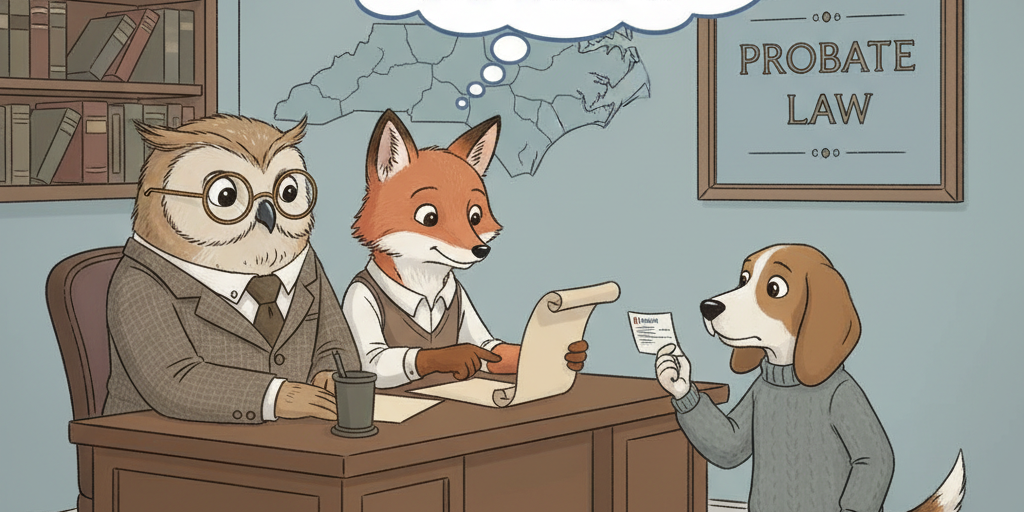Can I avoid court fees when outstanding estate checks return to the estate account? – North Carolina
Short Answer
Usually, yes. In North Carolina, the Clerk assesses estate fees on personal property first reported on the inventory and on new personal property received since the last account. Returned or voided checks that were never negotiated are not new assets; they should be documented as reversals so you are not charged fees twice. You must still pay the $15 minimum fee when filing each account, and total fees are capped by statute.
Understanding the Problem
You are the personal representative in North Carolina and issued cashier’s checks from the estate that were never delivered. Those funds have come back into the estate account. Your question is narrow: can you avoid additional court fees when you file your next account with the Clerk of Superior Court?
Apply the Law
North Carolina charges estate costs on personal property reported on the inventory and on new personal property received between accountings. Accounts are reviewed on a cash basis, and the Clerk requires proof for disbursements and receipts. If a check was never negotiated and is voided or refunded, it generally is not treated as a new asset for fee purposes when properly documented on your next account.
Key Requirements
- Fees apply to new personal property: The Clerk assesses a percentage fee on personal property first reported and on new receipts since the last filing, subject to a cap; each filing carries a minimum fee.
- Cash-basis accounting: Only actual receipts and actual expenditures count. Undelivered or uncashed checks are not completed disbursements.
- Returned funds are reversals, not new assets: If a check was never negotiated and the bank reverses/returns the funds, list it as a correction or reversal tied to the original disbursement, not as a fresh receipt.
- Documentation is required: Attach bank evidence (e.g., voided cashier’s check confirmation or refund advice) and a brief notation on AOC‑E‑506 so the Clerk does not double-count.
- Fee cap and minimum: The cumulative percentage fee is capped by statute; each inventory/account still incurs at least a $15 filing fee.
What the Statutes Say
- North Carolina Gen. Stat. § 7A-307 (Estate costs and fees) – Sets how estate costs are calculated, including fees on personal property and the cap/minimums.
- North Carolina Gen. Stat. § 28A-20-1 (Inventory) – Requires filing the inventory within three months of qualification.
- North Carolina Gen. Stat. § 28A-21-1 (Annual accounts) – Requires annual accounts and supporting proof.
- North Carolina Gen. Stat. § 28A-21-2 (Final accounts) – Sets deadlines and requirements for closing the estate.
Analysis
Apply the Rule to the Facts: Your cashier’s checks were issued but never delivered, so no completed expenditure occurred. When the bank returns or voids those funds, they are not “new personal property” for fee purposes. On your next AOC‑E‑506, tie the returned amount to the original check as a reversal with bank proof. That should prevent double-counting and avoid extra percentage fees, though the $15 minimum filing fee still applies.
Process & Timing
- Who files: Personal representative. Where: Clerk of Superior Court (Estates Division) in the county of the decedent’s domicile. What: File AOC‑E‑506 (Annual/Final Account) and attach a schedule noting “Returned/Voided Checks,” bank documentation (void/refund confirmation), and cross‑reference to the original check entry. When: Annual account is due 30 days after one year from qualification (or by the 15th day of the fourth month after the estate’s fiscal year end); the final account is due by the timelines in statute if closing earlier.
- Ask for a pre‑audit or brief conference with the Estates clerk before paying assessed costs to confirm that the returned funds are treated as reversals, not new receipts. Processing varies by county and can take days to a few weeks.
- After approval, pay any remaining costs shown on the Estates Bill of Costs. Keep the approval and fee receipt with your records for the final account and discharge.
Exceptions & Pitfalls
- If a check was actually delivered and negotiated, the payment is a real disbursement; a later refund will appear as a receipt but should be identified as a reversal to avoid counting it as “new” property.
- Internal transfers between estate accounts are not new receipts; label them clearly to prevent fee assessment.
- Keep vouchers: without bank proof of void/refund, the Clerk may treat the return as a new receipt and assess a percentage fee.
- Real estate nuance: proceeds of a real property sale that come into the personal representative’s hands do count toward fee calculations; carrying costs paid by heirs after death do not.
- E‑filing platforms may add processing fees that are separate from the statutory cap; procedures and amounts can change.
Conclusion
In North Carolina, estate fees are charged on personal property reported on the inventory and on new personal property received between accountings, with a per‑filing minimum and a statutory cap. Returned, undelivered, or voided checks generally are not new assets and should be shown as reversals tied to the original entry, with bank proof, to avoid duplicate fees. Next step: list the returned funds and supporting documentation on your next AOC‑E‑506 and confirm fee treatment with the Clerk before paying.
Talk to a Probate Attorney
If you’re dealing with returned estate checks and unclear court fees, our firm has experienced attorneys who can help you understand your options and timelines. Call us today at [919-341-7055].
Disclaimer: This article provides general information about North Carolina law based on the single question stated above. It is not legal advice for your specific situation and does not create an attorney-client relationship. Laws, procedures, and local practice can change and may vary by county. If you have a deadline, act promptly and speak with a licensed North Carolina attorney.


